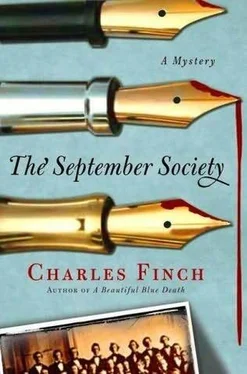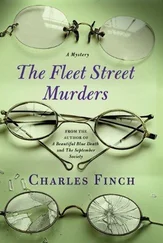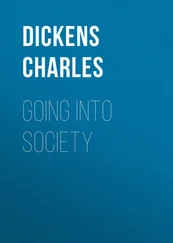Charles Finch - The September Society
Здесь есть возможность читать онлайн «Charles Finch - The September Society» весь текст электронной книги совершенно бесплатно (целиком полную версию без сокращений). В некоторых случаях можно слушать аудио, скачать через торрент в формате fb2 и присутствует краткое содержание. Жанр: Исторический детектив, на английском языке. Описание произведения, (предисловие) а так же отзывы посетителей доступны на портале библиотеки ЛибКат.
- Название:The September Society
- Автор:
- Жанр:
- Год:неизвестен
- ISBN:нет данных
- Рейтинг книги:4 / 5. Голосов: 1
-
Избранное:Добавить в избранное
- Отзывы:
-
Ваша оценка:
- 80
- 1
- 2
- 3
- 4
- 5
The September Society: краткое содержание, описание и аннотация
Предлагаем к чтению аннотацию, описание, краткое содержание или предисловие (зависит от того, что написал сам автор книги «The September Society»). Если вы не нашли необходимую информацию о книге — напишите в комментариях, мы постараемся отыскать её.
The September Society — читать онлайн бесплатно полную книгу (весь текст) целиком
Ниже представлен текст книги, разбитый по страницам. Система сохранения места последней прочитанной страницы, позволяет с удобством читать онлайн бесплатно книгу «The September Society», без необходимости каждый раз заново искать на чём Вы остановились. Поставьте закладку, и сможете в любой момент перейти на страницу, на которой закончили чтение.
Интервал:
Закладка:
It only took a moment for Jenkins to calm the situation down, despite Butler’s and Maran’s repeated, slightly hysterical claims that Lenox had trespassed on private property and that he was a burglar. At the same time, Dallington rushed over to Lenox and kneeled beside him.
“Where did they get you?” he said. His eyes were rimmed red with a hangover, but he seemed alert and energetic.
“How did you get here?”
“Look, Lenox, I’m sorry about yesterday. I don’t even remember seeing you. A relapse. It won’t happen again.”
Lenox laughed wryly. The pain was starting to become more intense. “Don’t mention it. How did you find us?”
“McConnell.”
Just then Lenox saw McConnell rushing up, a look of deep concern on his face and his battered leather medical bag in his hand. “Charles, good God, you’re shot! Where did they get you?”
“My chest, it went just between my chest and my left arm.”
McConnell tore away the shirt and then breathed a sigh of relief. “Thank the Lord, Charles, only a grazing wound. Painful, but you’ll survive it.”
Dallington was everywhere, pointing out various members of the September Society, directing Jenkins and the constables, barking at Hallowell as he searched his pockets.
As McConnell went about bandaging the detective up, Payson began to come out, but Lenox motioned him to stay behind the cupboard. Jenkins came over and had a word: Everybody in the room would be taken as a witness, to begin with, except for Hallowell. He would be charged with attempted murder-and, if Lenox had anything to do with it, the murder of Bill Dabney. What had Payson said about the man he had seen running from Dabney’s body? Dressed as if he were a valet or a waiter, graying hair. The description matched.
After the bandage had gone on securely, Lenox stood up and staggered to the couch, where he sat down heavily.
“We still have something to do,” he told Jenkins, who had just come over as the members of the September Society filed out.
“What?”
“Canterbury. I know where he is.”
“Where?”
“I don’t want to say too much, in case I’m wrong.”
But he knew he wasn’t. There was a surprise left in the case yet, even after all this drama.
“I’ll have to stop off and see my brother to get the address. George,” Lenox went on, calling to Payson, “you had better come, too.”
“George?” said Jenkins, and as Payson emerged from his hiding place an astonished Dallington said, “Payson! Good God!”
Payson said, “Is that you, Dallington? Haven’t seen you since last fall. How did you come to be mixed up in this?”
“Gentlemen,” said Lenox, “George Payson.”
Briefly Lenox explained the past week of the lad’s life.
“What a blow to Dabney’s parents,” said McConnell, grimacing.
Payson looked down at his feet. “I wish I could have done it all differently,” he said. It was the final hint of a reproach anyone made.
Questions all answered-Jenkins in particular had a few points he wanted cleared up-about fifteen minutes later Lenox, Jenkins, McConnell, Dallington, and Payson left. Jenkins had given his constables detailed instructions about the care of the prisoners and witnesses at the scene, and McConnell had checked on Lenox’s wound and reluctantly pronounced the detective fit to move.
They took McConnell’s carriage to Parliament, and Lenox dashed inside and had a word with Edmund. They came out a moment later together, and Edmund joined the miniature carnival. As they bumped along eastward, Lenox smiled inwardly. Only yesterday he had considered himself all alone in this endeavor, and now he was surrounded by friends and allies.
“I was stupid to trust Hallowell,” Lenox said. “From the beginning he was so eager to speak with me. I assumed he was simply bored with his job, but the Society must have seen me before I saw them, so to speak-must have had their handyman out to meet me for precisely such a scenario.”
“I wonder that you thought of it before he came in,” Payson said.
“Still, not quickly enough. It wasn’t a total loss, though, thanks to Dallington. We overheard them talking cold-bloodedly of murder. And if I’m not very much mistaken there are two serious financial crimes involved-one ancient and one ongoing-which we’ll learn about shortly.”
Pressed for more though he was, Lenox refused to say anything further in case he was mistaken. He had an idea of what had happened, but he knew the man calling himself Canterbury would be able to tell the story definitively.
If the West End part of London was unique in all the world, the height of cosmopolitan fashion, the East End was like the slums of Paris, of Cairo, of New York, of Vienna. There were the same narrow, darkened streets, the same low-lit pubs with their constant suggestion of imminent violence, the same ragpickers and children turning cartwheels for halfpence. They were coming into Gracechurch Street now, in the ward of Bishopsgate. Though it was violent and falling to pieces, Lenox had a peculiar affection for it and visited from time to time, for one reason: It was more or less the epicenter of the old Roman settlement of Londinium. The basilica, or public church (the biggest of its kind north of the Alps), and the forum had both run along it in those ancient days, and while they were gone Lenox could still picture them. At its pinnacle in the second century A.D., Londinium had been a civilized, fascinating, and cultured outpost of the empire. It was one of Lenox’s favorite subjects within Roman history, combining as it did the remote and the familiar.
The carriage turned up Cannon Street and into Eastcheap. When they reached a low-slung red building with two torches blazing out front, Edmund nodded his head to his brother, and the carriage halted.
The ground floor inside the building was undivided, one large room with its roof held up by beams. In one part was a gin bar, where men and women flirted with each other and drank. In another was a curtained-off area where the same women could conduct their business. To the back of the room was a stairwell, which led to the rooms upstairs. At the center of it all, a wizened old woman with a monocle and a cat on her lap presided over the scene, collecting money from the girls, monitoring the bar for any arguments that might get out of hand, and barking commands to two large men who kept it all in order.
Lenox and Edmund went to her and had a whispered word. At first she shook her head furiously; then Lenox pointed to Jenkins, and the woman threw her hands up, as if conceding the point, and told them something.
The two brothers went back to the group.
“On the third floor. I’ll lead, if you’ll stick by my side, Jenkins. I doubt you’ll have any cause to use your shackles, but it’s not impossible. George, come up beside me, won’t you? You’ve met Canterbury before, I believe.”
There were two doors on the third floor. Lenox led the way to the right and knocked.
“Hullo?” There was no response. “Hullo? Canterbury? We’ve a large group here. George is here.”
There was a shuffling in the room.
“I’m going to come in,” said Lenox. “We don’t mean you any harm, I promise.”
Lenox turned the doorknob, and they all crowded around him to see inside. It was a large, drafty, out-of-sorts room with a bed, a desk, and a chair as its only adornments. A man- dark hair, average height, a military bearing, with a scar on his neck-sat in the chair. He was holding a revolver.
“Stand back!” he said. “Who-why, is that Charles Lenox?”
“It is.”
“And Edmund? Good Lord! No wonder you found me here. My old haunt. Who have you brought, though?” The gun, which he had let fall to his lap, rose again.
Читать дальшеИнтервал:
Закладка:
Похожие книги на «The September Society»
Представляем Вашему вниманию похожие книги на «The September Society» списком для выбора. Мы отобрали схожую по названию и смыслу литературу в надежде предоставить читателям больше вариантов отыскать новые, интересные, ещё непрочитанные произведения.
Обсуждение, отзывы о книге «The September Society» и просто собственные мнения читателей. Оставьте ваши комментарии, напишите, что Вы думаете о произведении, его смысле или главных героях. Укажите что конкретно понравилось, а что нет, и почему Вы так считаете.












